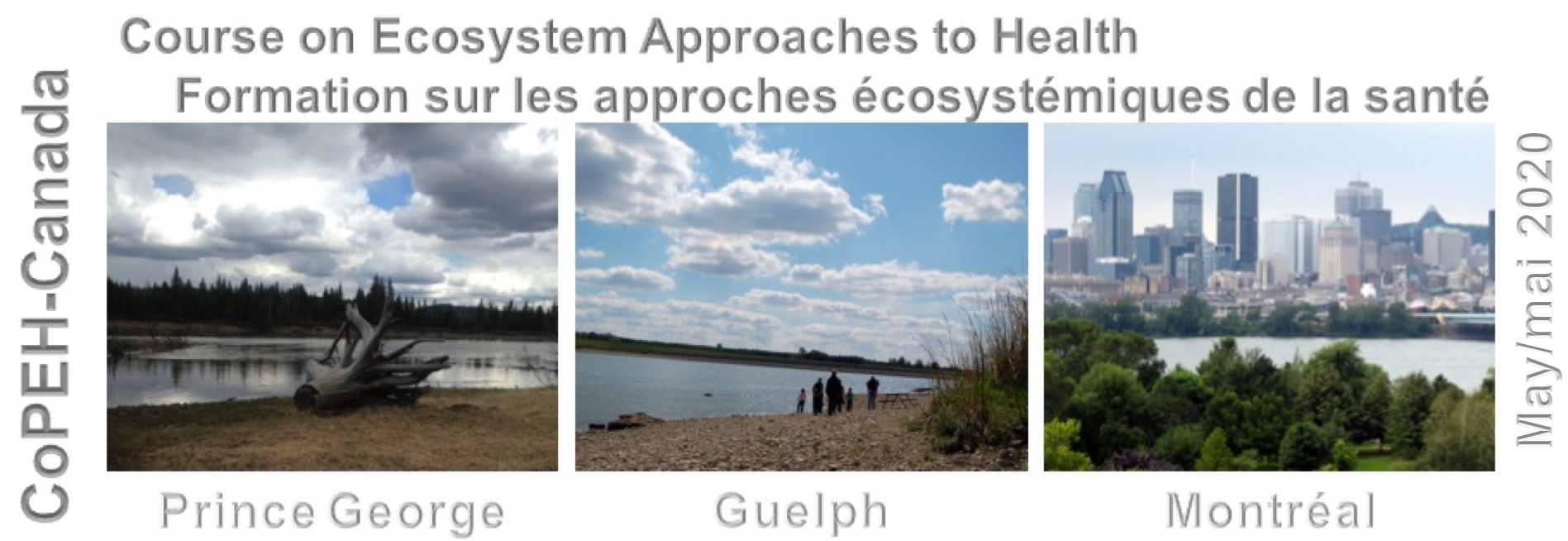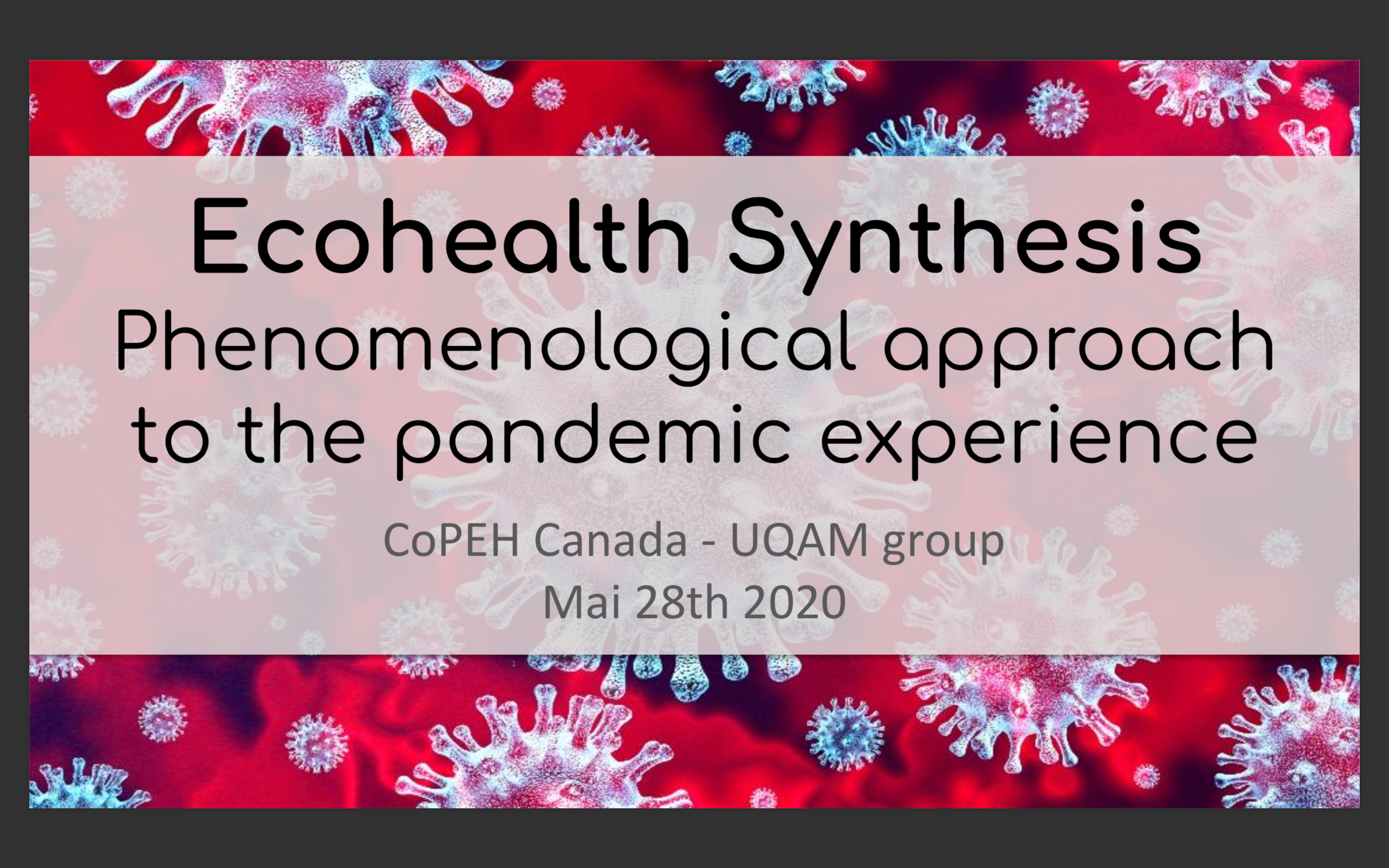

Tamped down or spruced up? How we ran a field course on health and ecosystems online during a pandemic
 |
|
The CoPEH-Canada hybrid course and webinar series on Ecosystem Approaches to Health is a part online, part face-to-face graduate level course offered each year in May at four “sites”: Montréal (UQAM), Guelph (University of Guelph), Prince George (University of Northern British Columbia) and an online “site.” Eight two-hour sessions are conducted as simultaneous webinars across the sites. The rest of the time for the three onsite groups are locally run sessions. We offer a rigorous, hands-on pedagogical approach. The course is available to graduate students from all disciplines and also to professionals interested in these themes. An experienced, pan-Canadian team presents innovative and dynamic approaches for better understanding the multiple factors which influence health on issues at the confluence of health, the environment and society. |
It was March 2020. We were deep into the nitty-gritty of planning for our annual hybrid field course on ecosystem approaches to health (see side bar), which we’ve been running since 2008. It was the moment where we begin contacting community groups for field visits. But would we be able to go into the field in May considering the worsening state of the Covid-19 pandemic? June maybe, but May? Was it ethical to ask already strapped community groups to commit to and prepare for something that might not happen?
Questions arose about whether we should cancel this year’s course. After all, it is a FIELD course. We called a brainstorming session amongst our seasoned course planning team, and left emboldened by the possibilities. In this blog we discuss some of the innovative teaching tools and activities that we used to *replace* the field component while still providing access to a variety of voices and perspectives and a connection to place and the land.
DIALOGUE AMONG COURSE PARTICIPANTS
Our hybrid course attracts students and professionals from an array of fields and epistemological backgrounds. We always include space for dialogue in our courses, but this year we decided to increase the webinar time by a half an hour. This half an hour was dedicated to exchange across sites and between participants. Some of these were open discussion periods on the topic of the day and others were slightly more structured activities on a given topic. For example, in addition to having students develop a poster on their project from an ecosystem approaches to health perspective and getting written feedback from their peers, this year we included a “speed dating” activity where, in break-out rooms of three people, they presented their poster in 2 minutes with time for discussion at the end. Technological challenges getting into breakout rooms cut into some groups’ time, but other groups had sufficient time to learn about someone’s work that they wouldn’t have otherwise. In the ‘lessons learned’ category, we found that these sorts of activities need to have ample time allocated to movement and glitches.
NARRATIVE READINGS
One of the principles or patterns of Ecosystem Approaches to Health is transdisciplinarity. In general, transdisciplinarity encompasses inviting different ways of thinking into our lives and work.
In light of this, we encouraged participants to engage with the narrative form during the course, providing new perspectives despite the context of confinement where we were not able, in the end, to interact in the field. We pre-selected books - novels and poetry - for participants to engage with before and throughout the course.
These books all have to do, to greater and lesser extents, with the course theme - the health of humans and other species in their watershed. The place-based nature of some of the books, set in regions roughly around the four "sites" with an "international" focus representing the webinar group, helped us replace some of the land-based learning that usually occurs in our field course.  2020 CoPEH-Canada hybrid course on ecosystem approaches to health fiction reading list
2020 CoPEH-Canada hybrid course on ecosystem approaches to health fiction reading list
During one of the webinars we hosted a "book club" to exchange what we learned/reinforced through the readings. Break out rooms for each book were created and a rich discussion followed. In the debrief of the full course, one of the university sites mentioned that the narrative reading was one of the most enriching aspect of the course, but that it wasn’t “capitalized” on enough throughout the course. We are now exploring ways to make the most of this exercise and have decided to keep it even if the course goes back into the field in 2021. We are currently drawing up the list for 2021, and we would like to increase the diversity of voices represented.
INDIVIDUAL FIELDTRIPS
In lieu of going into the field together, we asked participants to make directed forays into grocery stores and parks. Here is an example of what we asked the students to do on a trip to the grocery store (or other store) (and only if they were going out anyway). We suggested that they be creative and take “evidence” (photos, drawings, audio tracks, examples of new products,) in a safe and respectful manner.
The following week we had a conversation about the students' observations.

|
Ask yourself the following questions [at the grocery store] and think about possible answers.
|
EXPLORING THE COMMON EXPERIENCE OF THE PANDEMIC
In our hybrid course on ecosystems and health, we usually develop learning through a case study in the field. Recently, our case studies have focused on the health of humans and other species in the watershed. Each site developed their own case study, but the issues raised in each location were relatively similar, creating a “common experience” within and even across sites. For 2020 we selected the ‘shared experience’ of COVID-19. We usually end the course with the presentation of a group artifact or rich picture map, a project that groups of students work on together to present their learning over the course of the month. This year we asked them to work together to explore and reflect on the ecosystem approaches to health principles through a “synthesis activity” based around COVID-19. We invited three researchers, Mélanie Lefrançois (UQAM), Samira Mubareka (Sunnybrook Research Institute) and David Waltner-Toews (U. Guelph, CoPEH-Canada elder), to comment on the students’ presentations.
The students rose to the occasion, working across platforms, time zones and language barriers to present us with three very insightful takes on links between the pandemic and ecosystem approaches to health.
 The title slide of one of the three “synthesis” presentations by student groups participating in the 2020 CoPEH-Canada hybrid course on ecosystem approaches to health
The title slide of one of the three “synthesis” presentations by student groups participating in the 2020 CoPEH-Canada hybrid course on ecosystem approaches to health
GOING AGAINST THE GRAIN
As teachers, we know how hard the transition to online learning has been in most contexts. We, in no way, advocate for a whole-scale virtual transition in learning. Much is lost in the cloistering away of courses into the internet: connection with land, human warmth, spontaneous learning amongst students, intuition, attention and concentration. We do believe, however, that it is possible, if necessary, to bring some field-oriented classes online and to do it successfully; context matters.
First, hats off to our students, who embarked on this journey with us, rolled with it, and sometimes humored us and our efforts to innovate. They are really the ones who made the course a success. As graduate level students and professionals their level of enthusiasm was perhaps higher than for some other student groups. Further, since this was a graduate level seminar at the three universities, the “for-credit” groups were small, averaging around 8 students, which makes for more fluid exchanges.
Another factor contributing to our positive experience is the long-standing teaching relationship between collaborators on this course, including good communication, trust and a bank of collectively designed activities to lean on[1]. This raises the question, though, to what extent this type of relationship and trust can be constructed online. When we first started working together on these courses 12 years ago many of us did not know one another and came from various disciplinary background. We had numerous face-to-face meetings and workshops in which we negotiated in order to create a course that would not be a disconnected hodge-podge of expertise. This was done during the formal meetings, but also at breaktime or over lunch or dinner. We learned not only to trust our colleagues’ expertise, but also to trust them as people, period. Can this happen on-line?
We sincerely hope that next year the world will be a safer, healthier place and that we won’t need to run our course online. But in either case, we will be ready with the interactive and innovative ways to learn about ecosystems and health that we trialed this year, namely more time for exchange, including fiction in our teaching, reflexive exercises and coalescing around a shared experience.
[1] If you are interested in learning more about our teaching style and activities we have collected some of our materials into a teaching manual.